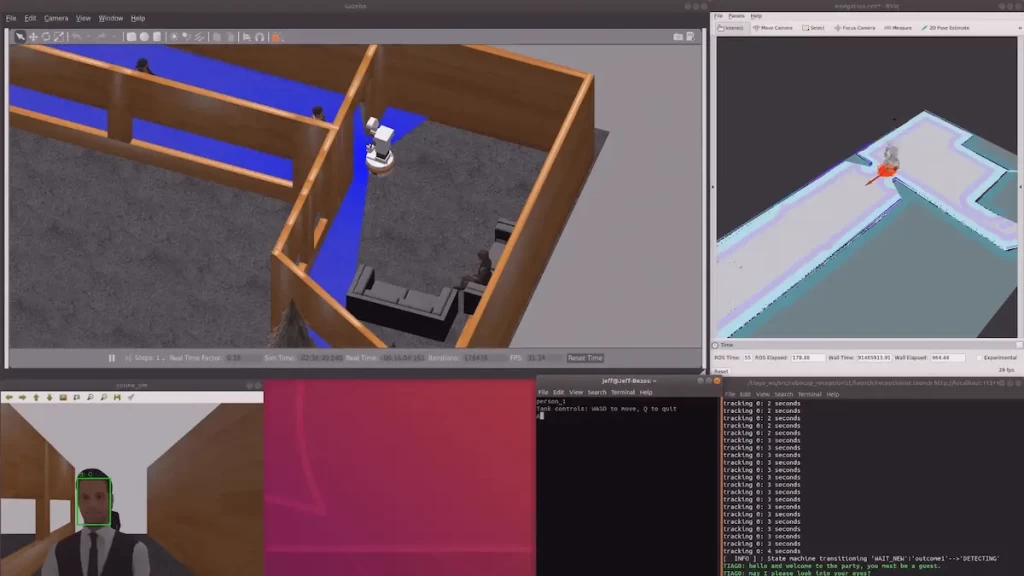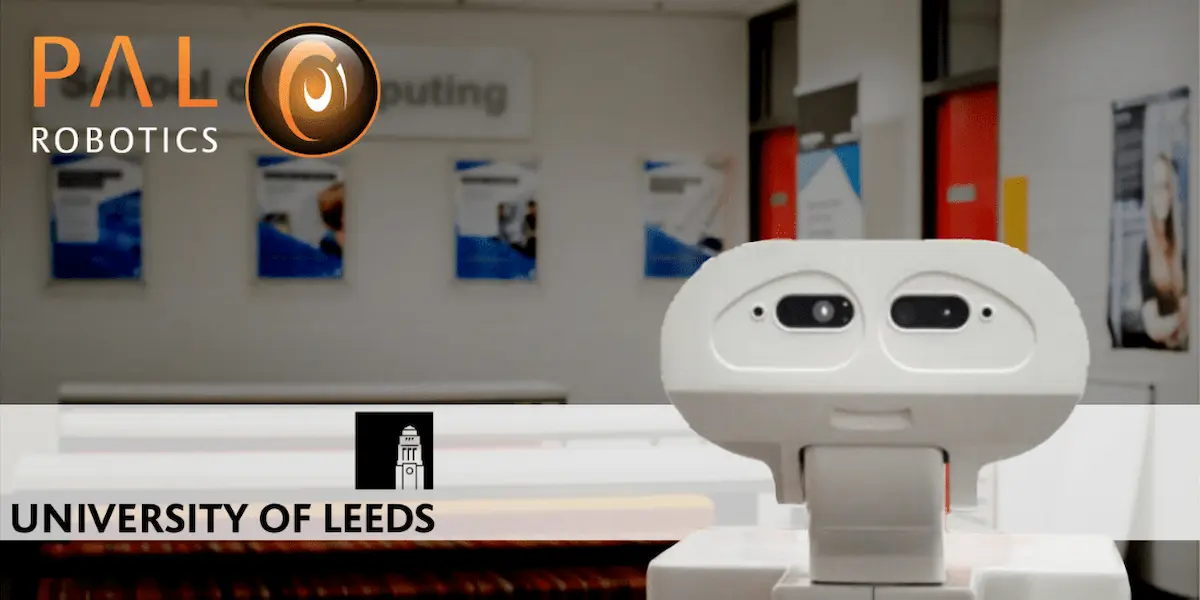RoboCup@Home Education Challenge and benefits of robotics competitions
Our TIAGo robot is an important member of the LASR team (which stands for Leeds Autonomous Service Robots) recently formed at the University of Leeds to compete in robotics challenges.
We managed to talk with Dr Matteo Leonetti to hear more about the LASR team’s recent win in the RoboCup@Home Education Challenge using the TIAGo robot: the team won gold in the challenge, which was held online. As part of the challenge, students had to program robots to help a customer from a shop carry shopping bags to their car. In addition the robots hosted a party, and served food to customers in a café.
We also asked Dr Leonetti more about how his team works with TIAGo in their lab at the Sensible Robots research group, challenges they face and how he sees the future of robotics, especially in relation to HRI (Human Robot Interaction).
Dr Matteo Leonetti set up the LASR team and is a Lecturer in the School of Computing at the University of Leeds. His research focuses on decision making, planning and reinforcement learning for autonomous robots. Before coming to Leeds he was a postdoc at the University of Texas at Austin and prior to that, a postdoc at the Italian Institute of Technology.
When asked about the experience for the LASR team taking part in the RoboCup@Home Education Challenge, Dr Leonetti told us, “I asked my students this question, most of them were entirely new to robotics, and they said they found it both interesting and challenging. They said that overall they learnt a lot, and this is thanks to the RoboCup Education team, who put a lot of effort into organizing the courses and providing the material.”
He continued, “even if the competition aspect was at times stressful, especially having to coordinate entirely online and remotely, they also found it very rewarding to create for the first time something of their own, as a team. Winning also added to the spirit, I think.”
Dr Leonetti spoke enthusiastically about the benefits of competitions in terms of teamwork and helping team members channel their efforts, “competitions highlight particular scientific or technological challenges, and help in focusing the efforts of the community in specific directions.”
He added, “they are also a wonderful means to involve young researchers in robotics, even before their university studies, giving them a clear and measurable goal to work towards, as well as being highly motivating and rewarding. Competitions also favour teamwork within each team, as well as across teams. In the RoboCup Challenge, for instance, teams are encouraged to share their results and software developments with the community, raising the level for teams year on year.”

Skills required for winning competitions including teamwork and problem solving
In terms of the skills needed for winning competitions, Dr Leonetti told us his views, “a mixture of solid teamwork and strong individual contributions are essential for success. With our recent RoboCup experience, everyone had an integral role to play, and was both responsible for figuring out solutions to specific problems and for the integrations with the rest of the software. ROS certainly helps in its modular approach, but it’s also necessary to have a motivated team, who do their own research to find out the best tool or approach for each challenge. Our team went over research papers well beyond their academic level, and being able to navigate this type of literature is an important skill. I am constantly amazed by what first-year students can do if they set their mind to something. Another fundamental skill is resilience, being able to bounce back when something doesn’t work, which inevitably happens.”
Working with TIAGo: mapping and navigation modules and hardware for perception and interaction
When asked about challenges the group has faced that TIAGo helps to solve, Dr Leonetti said, “the tools that PAL Robotics provides for robot simulation are key to being able to work remotely. I also make full use of robot simulation in allowing students to be able to experiment safely. This lets the students have a working simulated 3D TIAGo robot in no time, which is crucial for teaching.”
He went on to explain, “the mapping and navigation modules that the robot comes with make navigation reliable both in simulation and on the real robot, which allows us to focus on higher-level decision making. Also, for what concerns the real robot, TIAGo’s hardware is capable of accurate perception and interaction with the environment. All components: the camera, mobile base, and arm etc are easy to control, even for beginners, which again allows us to focus on the task at hand, rather than on the nuts and bolts of the robot. Our team managed with having minimum mechanical experience and working entirely on AI while the robot “just worked”, most of the time, anyway!”
Sensible Robots research group: robotic systems that plan their actions and learn from experience
At the Sensible Robots research group the team looks at reinforcement learning for autonomous robots, Dr Leonetti explained, “at the Sensible Robots research group at the University of Leeds, our research is centred on autonomous decision making. We work in planning, reasoning, and reinforcement learning, to make robots versatile and able to execute a wide variety of tasks; as well as being adaptive and constantly adjusting to the environment and the users for successful long-term deployment.”
Dr Leonetti continued, “The name Sensible for us means that the robots we work with reason about what they do, and learn from their mistakes. We work on decision making systems that both plan their actions and learn from experience. The ultimate goal is to have autonomous systems capable of long-term autonomy, to be deployed in a variety of environments, and able to interact with people.”
“We work on different areas of reinforcement learning, mostly around knowledge transfer between different tasks. We also work on difficult planning problems, which would take a robot minutes to solve, and that can be solved much more quickly taking advantage of similar problems it faced before. While accumulating knowledge often slows down autonomous systems, giving them more to process, they should instead become faster and increasingly capable, which is what we work towards.”
The future: service robots to become “personal” robots and robots to adapt to users
Regarding challenges in robotics and expected change over the next five years, Dr Leonetti shared his thoughts, “in terms of what we are working on, first of all, service robots need to be able to operate in more of a variety of environments in order to become “personal” robots. For example in this sense, people’s homes and offices are much more unpredictable than factories.”
He also shared more thoughts on robots adapting to users, telling us, “secondly, we want robots to be able to adapt online, during deployment, to the people they help or work with. This is a major challenge because recent machine learning methods thrive in environments that can be simulated, and people are, so far, difficult to include in such simulations. We need machine learning methods that can both learn online from the users, and guarantee that what they learn will not violate users’ trust in the robot. We are now at the stage where robots are increasingly in contact with non-technical users, and all the work in decision making is being extended to take into account this new, quite unpredictable, type of agent.”
We would like to thank Dr Leonetti for taking the time to talk with us. Find out more about the LASR team and the work at the Sensible Robots research group, both are part of the University of Leeds.
TIAGo the mobile manipulator robot combines perception, navigation, manipulation & Human-Robot Interaction skills out of the box. TIAGo robot has a modular design and can be configured based on customer needs. TIAGo customizations available include TIAGo Titanium, TIAGo Steel, TIAGo Iron and TIAGo ++, a dual-armed version of the humanoid robot.
To learn about the capabilities of TIAGo and the different customizations available visit our website. Finally, if you would like to ask us more about TIAGo as a research platform, do not hesitate to get in touch with us.
Don’t forget to check out our blog on robotics and research.
